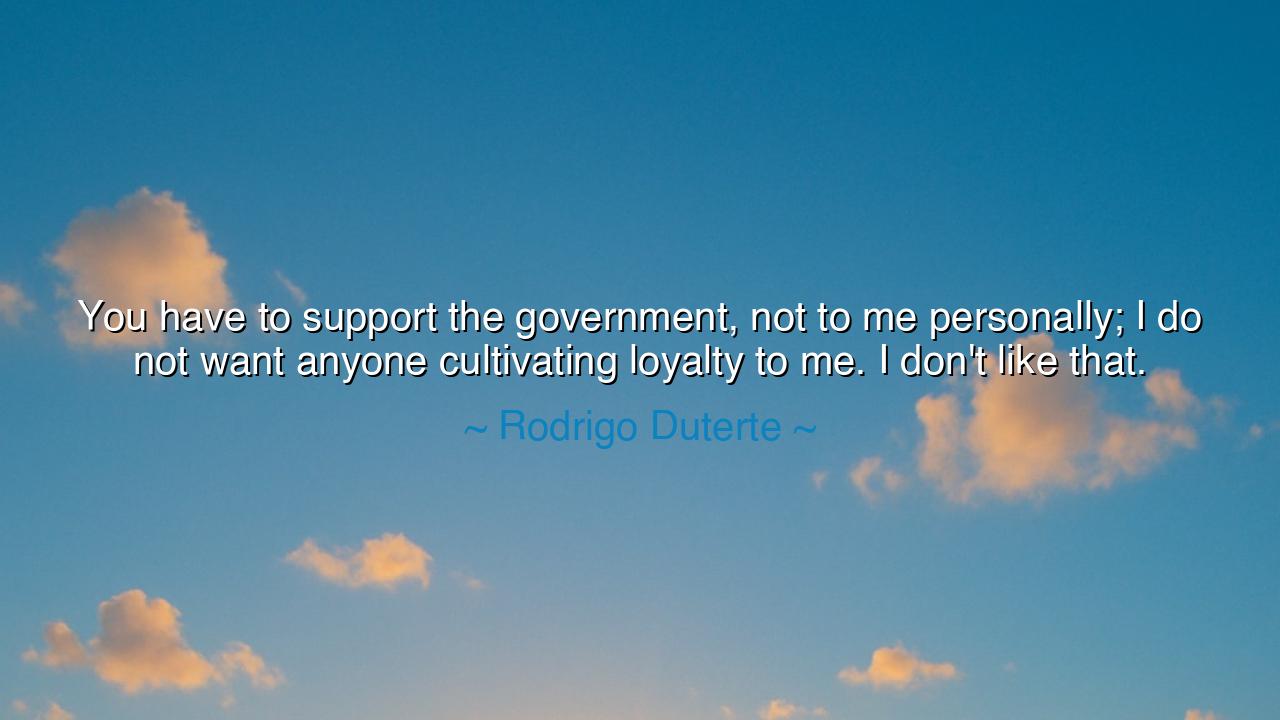
You have to support the government, not to me personally; I do
You have to support the government, not to me personally; I do not want anyone cultivating loyalty to me. I don't like that.






"You have to support the government, not to me personally; I do not want anyone cultivating loyalty to me. I don't like that." — Rodrigo Duterte
In this striking and humble declaration, Rodrigo Duterte, the former President of the Philippines, reveals a truth that transcends nations and ages — the distinction between personal power and public duty. His words carry the weight of ancient wisdom, spoken in the voice of a man who has seen the dangers of idolatry in leadership. When Duterte says, “You have to support the government, not to me personally,” he affirms that loyalty must belong to the institution of governance and to the people’s cause, not to the fleeting personality of any one leader. He stands, as it were, in the long lineage of rulers who understood that when allegiance shifts from principle to person, liberty decays and tyranny begins.
These words were spoken amid the turbulence of modern Philippine politics — a landscape shaped by passion, conflict, and intense devotion to charismatic figures. Duterte, both revered and criticized, understood that such personal loyalty, though flattering, is perilous. He knew that when citizens serve the man instead of the state, the laws of justice are replaced by the whims of power. His warning is not a denial of leadership but an affirmation of its noblest form: that true authority rests not in the strength of one’s name but in the endurance of the institutions that uphold the public trust. The leader may fall, but the republic must stand.
From the earliest civilizations, this truth has been echoed by the wise. In the ancient Roman Republic, the philosopher and statesman Cicero warned that devotion to a man, rather than to the laws of Rome, would destroy the republic’s very soul. And indeed, when the people’s loyalty shifted from the senate and its constitution to Julius Caesar, the republic fell. What began as reverence became obedience; what began as trust became bondage. The lesson of history is unchanging: when loyalty is given to a ruler instead of to justice and law, the state becomes the possession of the powerful, not the home of the free.
Duterte’s words also reflect the humility of one who recognizes the burden of leadership. A true leader does not seek worship, for he knows that praise is fleeting, and that blind loyalty blinds both the ruler and the ruled. It corrupts those who receive it and weakens those who give it. By rejecting personal devotion, Duterte affirms a sacred ideal: that leaders are servants of the state, not its masters. He reminds his followers that to serve their nation faithfully, they must be loyal to its constitution, its laws, and its people — not to the pride or glory of any single man.
This principle has shaped the rise and fall of countless nations. When George Washington, the first President of the United States, was urged to remain in power beyond his term, he refused, declaring that his loyalty was to the republic, not to his own reign. In stepping down, he taught his young nation that freedom endures only when institutions are stronger than individuals. Washington’s greatness lay not in how long he ruled, but in how willingly he relinquished rule. Duterte’s sentiment, in his own time, echoes this same wisdom — a call for loyalty to country over charisma, to duty over devotion.
And yet, Duterte’s quote also holds a subtle challenge — to both leaders and citizens. For it is easy to profess loyalty to the government when it is just, but much harder when it falters. His words demand maturity from both ruler and people: from the leader, the courage to be questioned; from the people, the strength to hold their government accountable without descending into chaos. True patriotism, he implies, is not blind faith, but principled fidelity — the willingness to support what is right and reform what is wrong, even within one’s own government.
So, O reader, ponder these words as a timeless counsel: that the health of a nation depends on the purity of its loyalties. Love your country more than its leaders. Defend your government when it is just; correct it when it strays. Do not worship men, for men are mortal; worship the ideals that make them worthy to lead. For as history teaches, it is not the adoration of leaders that preserves freedom, but the steadfast faith of citizens in the enduring strength of truth, law, and justice.
Lesson: The strength of a nation lies not in loyalty to its leaders, but in fidelity to its principles and institutions. To confuse the two is to invite tyranny in the disguise of devotion.
Practical Action: Support your government by upholding truth and justice. Respect leaders who serve humbly, but never surrender your judgment to their personality. Defend the rule of law, educate yourself in civic duty, and speak boldly when those in power forget their purpose. For the true servant of the state — whether leader or citizen — is one who honors not the face of authority, but the eternal spirit of the nation it was meant to serve.






AAdministratorAdministrator
Welcome, honored guests. Please leave a comment, we will respond soon